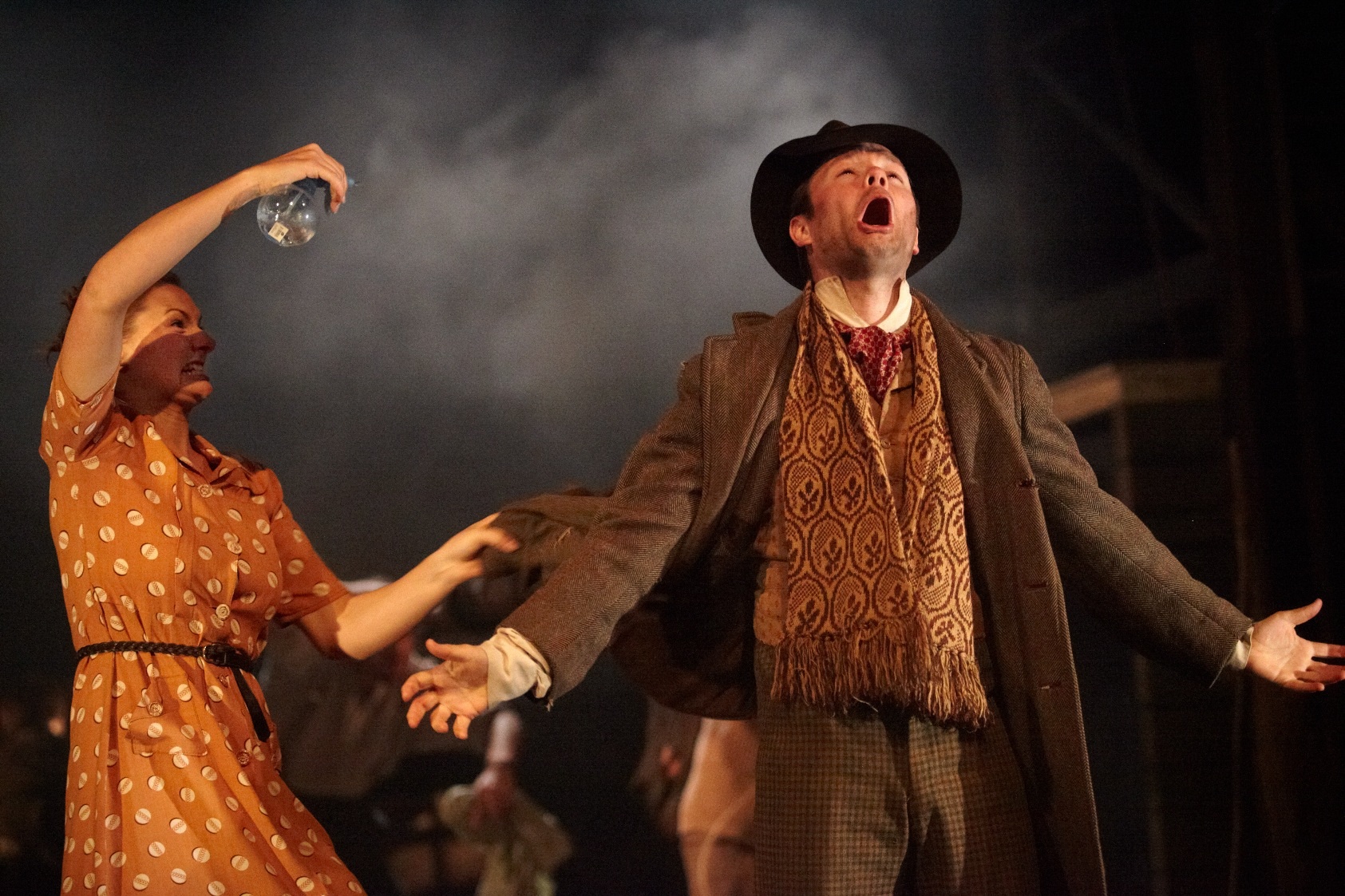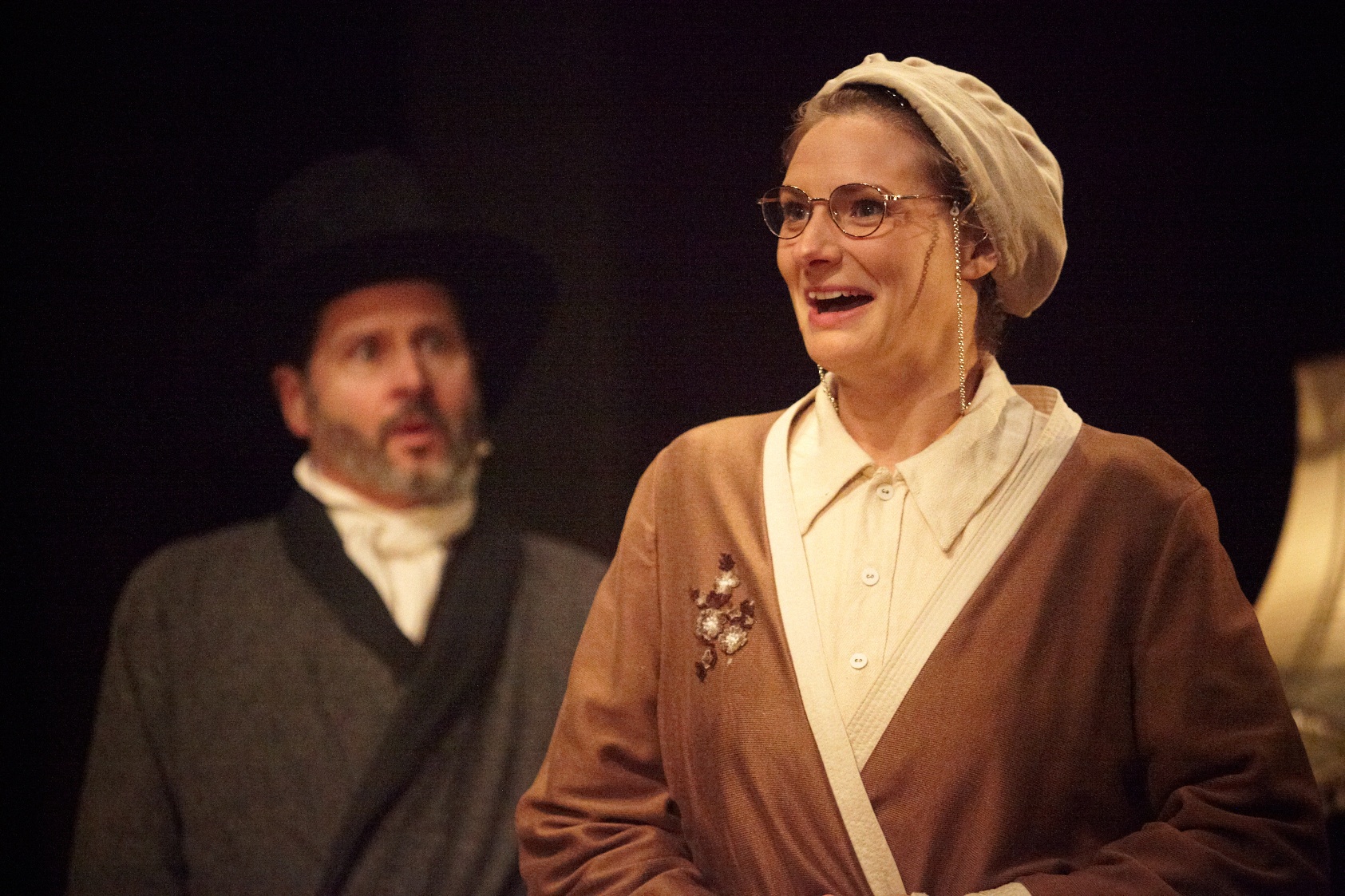John O’Keeffe’s 18th century classic Wild Oats is a play about players and an uproarious love letter to the theatre: a perfect fit for the re-opening, after 18 months of massive refurbishment, of Bristol’s Old Vic, originally constructed in 1766 and the oldest surviving working theatre in the UK.
When a group of players approached the city’s merchants at the end of the 17th century, seeking help with the establishment of a venue in which they might perform, Bristol’s plutocrats sent them packing, as theatrical activities were considered too subversive. Bristol’s first theatre was set up outside the city walls, near Jacob’s Well. In that liminal space, the players joined the city’s growing Jewish community, who were as much the object of mistrust as the masked masters of make-believe.
A tree appears, carried horizontally, through one of the stage-side boxes, as if out of the audience’s imagination
Theatre is all about illusion, and Wild Oats explores the way in which actors and non-actors play with identity, assume masks and costumes to position themselves within – and challenge - the social hierarchy. Mark Rosenblatt’s production moves at a furious pace – from the opening scene, in which the audience are blasted with the blinding light and roaring of motorcycles in hot pursuit of three naval deserters. We aren't appraised of the narrative details at first, so the explosion of noise and light takes us swiftly into a world of magic and transformation, in which nothing is ever quite what it seems, supernatural and yet very present. The rear of the stage is dominated by large tree trunks: we are in a glade, something like the forest of A Midsummer Night’s Dream, a world of make-believe in which anything might happen and the rules of everyday common sense no longer apply.
 The play’s often rapid scene changes – reminiscent of Shakespeare, and his modern disciple Brecht – are handled with visual imagination and dexterity. Moments of drama are produced with minimal means: a wild storm features old-fashioned wind machines worked by actors in vision at the back of the stage and a woman madly squirting wind-blown drizzle from an aerosol (pictured right). Later in the play, a tree appears, carried horizontally, through one of the stage-side boxes, as if out of the audience’s imagination. This is one of many moments in the show when Rosenblatt simultaneously creates gripping drama while subverting the illusionistic world of the theatre.
The play’s often rapid scene changes – reminiscent of Shakespeare, and his modern disciple Brecht – are handled with visual imagination and dexterity. Moments of drama are produced with minimal means: a wild storm features old-fashioned wind machines worked by actors in vision at the back of the stage and a woman madly squirting wind-blown drizzle from an aerosol (pictured right). Later in the play, a tree appears, carried horizontally, through one of the stage-side boxes, as if out of the audience’s imagination. This is one of many moments in the show when Rosenblatt simultaneously creates gripping drama while subverting the illusionistic world of the theatre.
Shakespeare haunts O’Keeffe’s play: the notions of the play within the play and “all the world’s a stage” are central to a story in which Jack Rover, a player who cannot resist quoting from the bard, and slipping in and out of various characters, seeks his calling as an actor as well as his identity as a man. This is a part that any self-reflecting actor would relish, and Sam Alexander displays a range of moods and expression that take the character way beyond the simply caricatural. He is not “Rover” for nothing, for he is always on the move, like the god Mercury, who is likewise a master of disguise, adept at wheedling things out of others, and as impossible to fix as the quicksilver to which he gives his name.
This is not just a director’s vision imposed on a talented bunch of actors, but ensemble playing brilliantly workshopped with input from all sides, not least the contribution of Lecoq-trained movement director Catherine Alexander. There isn’t a weak link in the chain and the transformation of Cornelius Booth from the vulnerable senior citizen Banks into the treacly theatrical manager Mr Lamp, in itself a demonstration of the play’s essential message, needs a programme check to confirm it. Philip Bird (pictured below, with Jo Herbert), whose puritan-black costume proclaimed his supposed uprightness, manages the Quaker Ephraim Smooth’s hypocrisy – another kind of play-acting – with just the right measure of satirical irony. Like Bristol’s "upright" merchants (the same ones who traded in wine and slaves) who didn’t want a theatre within the city’s walls, Ephraim tries to stop his sister Lady Amaranth, played with sensitivity and humour by Jo Herbert, from transforming her house into a theatre and joining in the frolics.
 The production makes full use of the newly restored thrust stage, which reaches out into the auditorium, creating the perfect space for the actors to make their asides to the audience, and create the intimacy which draws every spectator into the action. The pitch at which the show begins is exhilarating but the tension and humour are maintained with skillful use of pacing.
The production makes full use of the newly restored thrust stage, which reaches out into the auditorium, creating the perfect space for the actors to make their asides to the audience, and create the intimacy which draws every spectator into the action. The pitch at which the show begins is exhilarating but the tension and humour are maintained with skillful use of pacing.
This is a very funny play and a remarkably intelligent one too – as if O’Keeffe were, well before his time, the most exquisite post-modernist, able to occupy that illuminating area between theatrical convention and reflection on the form, without ever seeming heavy or didactic. On one level, Wild Oats is a supremely entertaining romp – you will laugh until you cry – but on another, it is a profoundly thought-provoking exploration of what theatre and acting are about.















Add comment